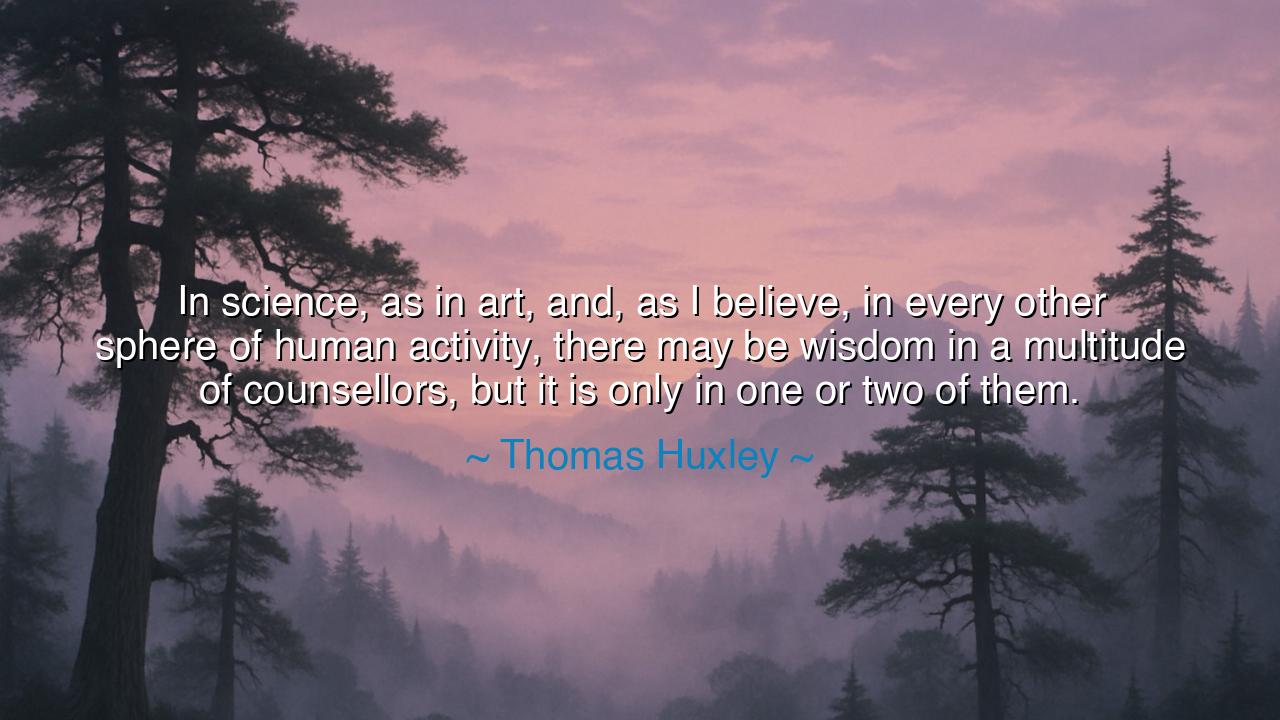
In science, as in art, and, as I believe, in every other sphere
In science, as in art, and, as I believe, in every other sphere of human activity, there may be wisdom in a multitude of counsellors, but it is only in one or two of them.






Hearken, children of the ages, to the discerning words of Thomas Huxley, who declared: “In science, as in art, and, as I believe, in every other sphere of human activity, there may be wisdom in a multitude of counsellors, but it is only in one or two of them.” In this pronouncement lies the eternal truth of discernment and guidance: that while many may speak, the voice of genuine wisdom is rare and precious, and it is only through the counsel of the truly insightful that human endeavor achieves greatness.
Huxley teaches that the crowd of advisers, though well-intentioned, cannot substitute for the mind illuminated by profound understanding. In fields of science, art, or any human enterprise, the multitude may offer many perspectives, yet it is often the insight of a single sage—or a chosen few—that clarifies the path, resolves uncertainty, and ignites breakthrough. True counsel is discerned not by volume, but by clarity, experience, and depth of perception.
Consider the tale of Galileo Galilei, whose revolutionary observations challenged the wisdom of the many. Though countless scholars clung to established cosmologies, it was the insight and courage of a few—themselves inspired by careful observation and reflection—that recognized the truth of his findings. Galileo’s story exemplifies Huxley’s teaching: wisdom is scarce, yet when found, it can illuminate the path of human knowledge and transformation.
The ancients understood this principle in their councils and assemblies. Kings and philosophers sought the guidance of those whose experience and judgment transcended the ordinary, knowing that the multitude may speak, but clarity emerges from the discerning mind. Huxley reminds us that true progress—whether in art, science, or governance—requires attentiveness to the rare voices that pierce confusion with insight and vision.
Thus, his words serve as both counsel and exhortation: cherish the abundance of advice, yet seek the few whose wisdom can guide action, whose vision transforms endeavor into achievement. To follow many blindly is to be led by noise; to heed the enlightened is to walk in light. Discernment and selectivity are as vital as courage in pursuit of understanding.
Carry this teaching, children of future generations: value the multitude, yet place your trust in the counsel of the wise. Let true insight guide your hand, your thought, and your creation, for it is only in the rare and luminous minds that the seeds of lasting progress and profound achievement are sown.






TKHUYNH TRUNG KHA
This quote makes me reflect on leadership and decision-making. In any field, it’s common to seek advice from many, but acting on all of it can lead to confusion. I wonder if Huxley is implying that discernment—knowing whom to truly listen to—is itself a form of wisdom. How can one cultivate that discernment without arrogance? Is wisdom inherently solitary, or can it be shared and developed through dialogue with others?
QMDao Quang Minh
I find the sentiment both sobering and realistic. It seems to warn against overvaluing consensus. Sometimes, the majority agrees out of comfort or conformity, while genuine insight comes from a minority voice. But doesn’t progress depend on both—the innovators who challenge and the crowd that supports or refines their ideas? I’m curious whether Huxley believed that wisdom must always be rare, or if education and experience can expand its reach.
TSNguyen Trong Sung
This makes me wonder: how do we identify the 'one or two' wise counsellors among the multitude? In science and art, it's easy to romanticize genius, but hindsight often defines wisdom. Could it be that those considered 'wise' are simply the ones whose perspectives time has validated? Maybe the multitude provides the raw material, and wisdom emerges only through collective experimentation and later reflection. What determines who history deems truly wise?
MPnguyen minh phuong
As a reader, I feel both agreement and discomfort with this perspective. On one hand, it acknowledges that true brilliance is rare; on the other, it feels a bit elitist. Does Huxley underestimate the potential of collaborative thinking? Perhaps wisdom can emerge from the interplay of diverse minds rather than residing in just one or two individuals. I’d like to know how he might view modern scientific teams where discoveries are often collective achievements.
HPDuong Hoang Phuc
I find this statement intriguing. It suggests that while many people can contribute ideas, only a few possess true wisdom or insight. Do you think this implies that collective input often dilutes originality? Or is Huxley emphasizing the rarity of deep understanding even among experts? I wonder how this notion applies today, in an era where crowdsourcing and collaboration are celebrated as paths to innovation. Can the wisdom of a few still outweigh the many voices online?